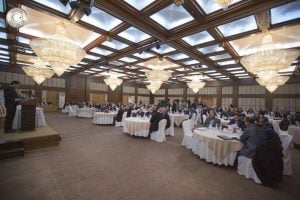By Sami Zaptia.

London, 8 February 2017:
Libya’s current economic crisis is caused by the distortion of its economy as a result of the fact that Libya is a rentier state dependent solely on hydrocarbon revenues, High State Council (HSC) Economic Development Committee member Mohamed Tabib said.
He was speaking at yesterday’s forum entitled: ‘‘To find a Mechanism for Non-State Finance of Development Projects’’ held at the Mahari-Radisson hotel in Tripoli. As the name of the forum suggests, the event was held in order to discuss the possibility of opening up the state projects to private sector financing as well as subsidy reform and the revaluation of the Libyan dinar.
Without any economic diversification, the drastic fall in Libya’s oil production and fall in international crude oil prices has led to a huge shrinkage in state revenues and a budget deficit, Tabib explained.
Tabib said that it was necessary to open up the opportunity for the private sector to expand its role in the Libyan economy and that the state and banking system should facilitate this expansion by encouraging domestic and foreign investment. All this cannot begin to happen without solving the current security problem.
The First Deputy head of the HSC, Salah Makhzoum, emphasized the link between stability and security, adding that it was necessary to work on realizing political stability and security in the country in order to move the wheel of the economy and development of Libya.
The state needed to make correct and brave decisions in order to fight corruption that is spread widely within its layers, the head of the General Union of Chambers of Commerce and Industry (GUCCI), Mohamed Raied said.
He added that the fact that there are two foreign exchange rates in the country (official and black market rates) is the ultimate proof of the existence of corruption. Equally, he said that the continuation of the commodity state subsidies of was like a cancer eating away at the economy.
He called for the Libyan dinar to be temporarily and gradually devalued over the year from its current official rate of LD 1.40 per dollar to LD 4 per dollar (as opposed to the current black market rate of around LD 6 per dollar).
This would give the opportunity for all citizens to obtain dollars without having to resort to corruption or middlemen. In return, the extra revenues that the state earns from this devaluation would enable it to solve its economic problems such as providing liquidity.
With regards to reforming state subsidies by exchanging them with a cash payment of between LD 300-400 for every family, this would teach efficiency in consumption, achieve social equality and would end the smuggling trade in subsidized goods.
Mohamed Beitalmal, the head of the Airports Authority said the reason for the failure of the public sector in the development of its projects and the development of revenues was the reliance on state funding. He stressed the need to involve the private sector in industrial and service projects.
He also stressed the need for the possibility of the private sector in investing in airports through the various participation models between the public and private sectors that are generally accepted in order to ease the burden on state finances.
Besides the organizing host, the HSC, the one-day event included representatives from the House of Representatives, Presidency Council/Government of National Accord, Central Bank of Libya, Audit Bureau, Administrative Control Authority, Ministry of Finance, Ministry of Planning, National Oil Corporation, Libyan Investment Authority, Airports Authority as well as other state institutions.







